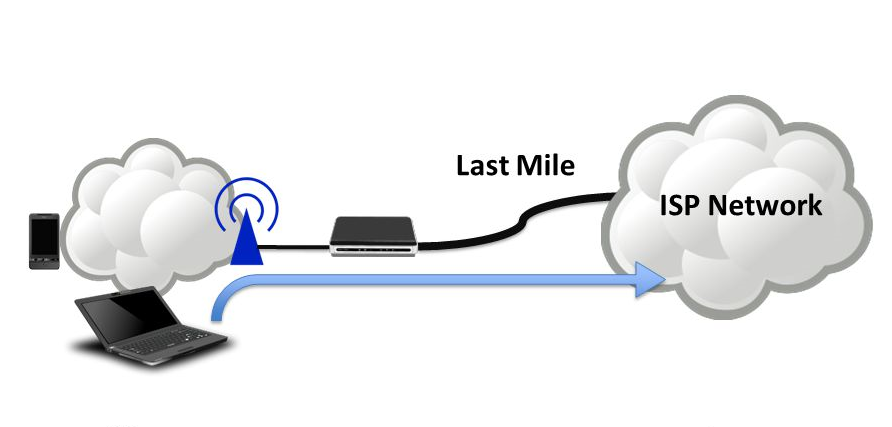The Best WiFi Solutions for Small Business
 Businesses depend on WiFi service. From employee laptops, tablets, and phones, to visitors in conference rooms, having the best WiFi for your small business is a critical component of your network infrastructure. And yet, for many small businesses, WiFi performance and reliability degrade over time. Most WiFi installations start with a focus on coverage — ensuring all areas and users have access to the service. Often neglected is capacity, the availability of bandwidth to ensure fast, reliable service for all users. For companies with small offices, and SMBs in general, the odds seem stacked against us. See why our services are vital if you need the best WiFi for a small bussiness.
Businesses depend on WiFi service. From employee laptops, tablets, and phones, to visitors in conference rooms, having the best WiFi for your small business is a critical component of your network infrastructure. And yet, for many small businesses, WiFi performance and reliability degrade over time. Most WiFi installations start with a focus on coverage — ensuring all areas and users have access to the service. Often neglected is capacity, the availability of bandwidth to ensure fast, reliable service for all users. For companies with small offices, and SMBs in general, the odds seem stacked against us. See why our services are vital if you need the best WiFi for a small bussiness.
- Installations typically use default settings, placing WiFi traffic on slower bandwidth service and on channels most susceptible to interference
- Wireless routers and access points sold to SMBs and small offices often lack settings (bandwidth steering, antennae power control, etc) needed to manage and tune performance
- Most SMBs and small offices do not have active monitoring of WiFi performance, or even periodic reporting about the quality of WiFi service
When SMBs and small offices have WiFi connectivity or performance issues, the typical response is to add additional access points or to increase signal power, “solutions” that often exasperate the problem.
You can and should have the WiFi connectivity and performance you need.
Even if lower cost wireless routers and access points have been installed, SMBs can still take steps to ensure WiFi connectivity and performance. And, you can do this without expensive equipment upgrades and installations. Take an approach recognizing that the quality of your WiFi service is not static. The environment in which your WiFi operates will change over time. Make sure you understand what might be slowing down your WiFi, and take preventative measures to ensure connectivity and performance over time.
Three Ways to Ensure Performance and Connectivity With the Best WiFi for Small Businesses
In today’s digital age, reliable network connectivity and high-speed WiFi connection is essential for small businesses to operate efficiently and stay connected with customers. However, with so many WiFi services available in the market, choosing the right one can be a daunting task. That’s why we have compiled a list of top WiFi services for small businesses that can ensure seamless connectivity and optimal performance.
1. WiFi Assessments:
Historically, WiFi assessments have been expensive; most SMBs cannot afford a few thousand dollars for a one-time assessment. These one-time assessments capture a point in time and may not recognize shifting usage, demand, and interference patters. These types of assessments are often vendor-led and recommend significant equipment upgrades and installations.
New technologies and services allow for one-time assessments to be completed for hundreds, not thousands, of dollars. Drop-in devices capture all WiFi traffic and feed the data to cloud-based, AI-driven analysis engines that diagnose and prioritize issues. The AI analysis engines are able to recommend specific solution actions addresses both your WiFi infrastructure and devices accessing the network. The drop-in devices capture all WiFi signals in the area, looking not only at your networks, but the behavior and impact of WiFi signals reaching your space from other locations. And, our recommendations focus on setting changes in existing equipment rather than upgrades and overhauls.
With this lower cost, SMBs can afford to run assessments as-needed when performance or connectivity issues arise, or on a periodic schedule. With periodic assessments, you capture and adapt to changes that occur over time, often preventing issues before they impact your business.
2. WiFi Monitoring:
Using the same intelligent technology and services, SMBs can now also afford on-going WiFi Monitoring. With continuous monitoring, the AI engine and analysis tools can look at historical trends and address changes to the WiFi environment. This service offers incredible value to restaurants, retail, warehouses, schools, and other locations where the number of WiFi connected devices (customer, employee, IoT, etc) and usage patterns change hour-to-hour, day-to-day, or over time. As the drop-in devices also provide remote network testing, the monitoring infrastructure saves valuable time and effort when testing or re-configuring WiFi services.
Because the monitoring is not depending on your existing infrastructure of vendors, the analysis is agnostic and the recommendations are not biased to any vendor solution.
3. Managed WiFi Service:
For the first time, SMBs can now afford to have a managed WiFi service. With managed services, WiFi routers, access points, and (hopefully) attached physical switches are connected to central management console. The console allows for active performance and connectivity alerts that can trigger service tickets and responses. The console also provides remote access to manage configurations and settings, diagnose issues, and resolve problems in real time.
As a managed service, we configure, monitor, and maintain your WiFi network to ensure it meets the needs of your business.
When combined with WiFi monitoring, Managed WiFi Services provide a complete WiFi service that adapts to the changing needs of your environment, ensuring connectivity and performance.
Implement the Best WiFi for Small Business Today
In conclusion, a reliable and high-speed WiFi connection is crucial for small businesses to operate efficiently and stay connected with customers. By utilizing the top WiFi services we have outlined above, small business owners can ensure seamless connectivity and optimal performance. These WiFi services offer a range of features that cater to the specific needs of small businesses. By selecting the right WiFi service, small business owners can stay ahead of the competition and provide the best possible customer experience.
We offer WiFi Assessments and Monitoring services powered by the Wyebot Wireless Intelligence Platform along with a range of Managed WiFi Service offerings. Please contact us for more information.


